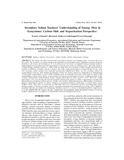Secondary school teachers’ understanding of energy flow in ecosystems: carbon sink and sequestration perspective

View/
Date
2014Author
Chimoita, Evans L
Embeywa 2, Herman E
Gweyi-Onyango, oseph P
Language
enMetadata
Show full item recordAbstract
The energy and other environmental conservation measures are emerging issues of concern all across
the world. The awareness on climate change and sustainable environmental resource utilization are being discussed
globally in all sectors of development. It is for this reason; the study investigated Kenyan biology teachers’
understanding of soil carbon sink and sequestration in Kenyan ecosystems as emerging issues. The study aimed at
relating biology teaching content to a wider scope of energy flow in ecosystem; a subject taught and assessed by
teachers of different secondary schools in Kenya. The study employed descriptive research design. Twenty- four
(24) secondary school teachers were randomly selected and sampled from thirty- six (36) secondary schools of
Lugari District in Kenya. Self-valuation questionnaire (SVQ) was used to capture key information on understanding
of soil carbon sequestration as some of the emerging issues in terrestrial ecosystems. The results revealed a rich
understanding of green house effects on the general environment among teachers assessed. A high percentage of the
teachers demonstrated understanding climate changes phenomena in their response (21%). However, a high
percentage (71%) of selected and assessed teachers lacked clear grasp on carbon sequestration concepts and
phenomena beyond photosynthesis process. Further, the teachers’ demonstrated poor understanding of premiums
paid by industrialized nations in a bid to mitigate environmental pollution, particularly via Green House Gases
(GHGs) (70%). The study, in conclusion revealed that, there was a general ecosystems knowledge gap among
biology teachers in Kenyan secondary schools concerning emerging issues particularly in ecology and is, therefore,
important that they get updates by undergoing refresher courses as a means of strengthening their competencies.
It is also probable that the teachers may have acquired the misconceptions during the period of study or it was an
indirect manifestation of complexes of interrelations between biological processes
URI
http://www.krepublishers.com/02-Journals/JHE/JHE-48-0-000-14-Web/JHE-48-3-000-14-Abst-PDF/JHE-48-3-461-14-2261-Chimoita-E-L/JHE-48-3-461-14-2261-Chimoita-E-L-Tx%5B14%5D.pdfhttp://hdl.handle.net/11295/81683
Citation
J Hum Ecol, 48(3): 461-467 (2014)Publisher
University of Nairobi
